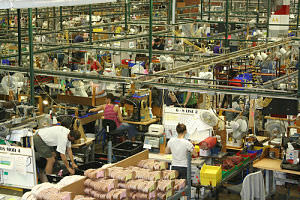Some Factory Jobs Return, Paying a Whole Lot Less
Unemployed American workers are glad to see factory jobs returning, but they're finding that the pay is drastically lower now, the result of a global race to the bottom for cheap labor. (more)
Unemployed American workers are glad to see factory jobs returning, but they’re finding that the pay is drastically lower now, the result of a global race to the bottom for cheap labor. Since the start of 2010, U.S. manufacturers have added 250,000 jobs, the first time since 1997 that the country is enjoying a sustained increase in factory employment. The Rust Belt in particular is beginning to see a turnaround, but workers will be making do with less income. Meanwhile, anti-union interests continue to chip away at workers’ right to organize and bargain, a sorry state of affairs for a country that must realize by now that being a “service economy” is getting us nowhere fast. — KDG
Your support matters…Washington Post:
The Rust Belt’s nascent recovery is being fueled by a host of factors, including a revitalized auto sector, innovations that have made workers more productive, and a weakened dollar, which makes American products more appealing for export.
Lower labor costs are also a critical factor. But many of the prospective workers who braved a cold rain Monday outside the old Hoover plant for a shot at a job with benefits did not complain.
“I was a little disappointed about the rate of pay,” said Leslee Valentine, 52, who rushed down to the factory after hearing about the job fair on the news. “But right now I’m on unemployment, so it looks pretty good. There is always that opportunity to move up.”
Independent journalism is under threat and overshadowed by heavily funded mainstream media.
You can help level the playing field. Become a member.
Your tax-deductible contribution keeps us digging beneath the headlines to give you thought-provoking, investigative reporting and analysis that unearths what's really happening- without compromise.
Give today to support our courageous, independent journalists.






You need to be a supporter to comment.
There are currently no responses to this article.
Be the first to respond.